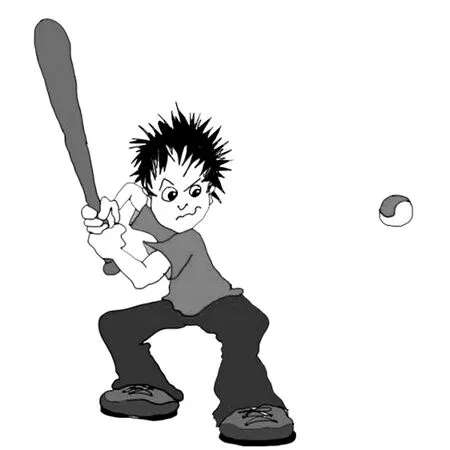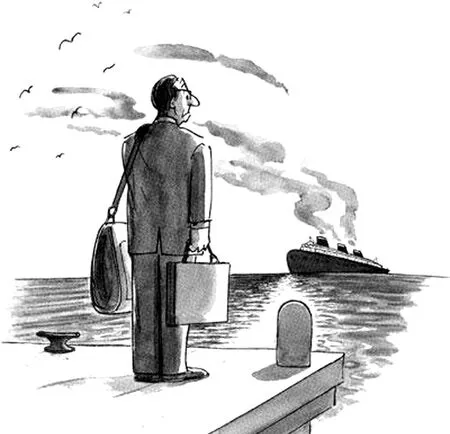“專(zhuān)注”用英語(yǔ)怎么說(shuō)
文/Cathy
1.keep your eye on the ball

該短語(yǔ)直接翻譯為“盯著球看”,源自棒球比賽,旨在暗示球員需要時(shí)刻注意球的位置。如果用在商業(yè)領(lǐng)域或生活中,它強(qiáng)調(diào)“專(zhuān)注”“集中注意力”“全神貫注”。如:
1)I graduated in just three years because I was able to keep my eye on the ball and prioritize(優(yōu)先處理)my studies above all else.
我僅僅三年就畢業(yè)了,因?yàn)槲夷軐?zhuān)注在學(xué)習(xí)上,一直把學(xué)習(xí)放在首位。
2)She won widespread(廣泛的)praise for her negotiating(談判)skills and her ability to keep her eye on the ball.
她的談判技巧和專(zhuān)注一件事情的能力贏得了廣泛的贊譽(yù)。
3)It’s important to keep your eye on the ballthis week,our biggestclientwillbe visitingthefactoryforrandom(隨機(jī)的)inspections.
本周,我們最大的客戶(hù)將到工廠進(jìn)行隨機(jī)檢查,大家保持專(zhuān)注很重要。
2.like a fish out of water

脫離水的魚(yú)肯定不適應(yīng)新環(huán)境。如果你覺(jué)得自己“像一條離開(kāi)水的魚(yú)”,你可能是處在一個(gè)陌生的、令人尷尬的環(huán)境中,或者周?chē)娜硕几悴灰粯印K裕摱陶Z(yǔ)用來(lái)指“渾身不自在”“不得其所的人”。如:
1)When Carla transferred to a new school,she felt like a fish out of water because she didn’t know anyone there.
當(dāng)卡拉轉(zhuǎn)學(xué)到一所新學(xué)校時(shí),她覺(jué)得渾身不自在,因?yàn)樗徽J(rèn)識(shí)那兒的任何人。
2)I felt like a fish out of water at my new school.
在新學(xué)校,我感覺(jué)自己很不適應(yīng)。
3)It’s completely normal tofeel like a fish out of water when you arrive at a new place,not knowing anyone.
當(dāng)你初來(lái)乍到一個(gè)新地方,又不認(rèn)識(shí)任何人的時(shí)候,你會(huì)感覺(jué)很不自在,這是正常的。
3.miss the boat

如果你沒(méi)有趕上渡輪去往下一個(gè)目的地時(shí),我們可以說(shuō)“I missed a boat”,但“miss a boat”作為俚語(yǔ),就與交通工具無(wú)關(guān)了。該短語(yǔ)通常指“錯(cuò)失良機(jī)”或者“錯(cuò)過(guò)……”“誤解……”。如:
1)The discounted price sale ended today and I just missed the boat on making a great deal.
打折出售活動(dòng)今天結(jié)束了,我錯(cuò)過(guò)了一筆大交易。
2)He missed the boat when he did not apply for the job in time.
他沒(méi)有及時(shí)申請(qǐng)工作,錯(cuò)過(guò)了好機(jī)會(huì)。
3)Ifyou don’tpay attention in class,you’ll miss the boat and do badly in your exams.
如果在課堂上不注意聽(tīng)講,你就會(huì)錯(cuò)過(guò)重要內(nèi)容,在考試中也會(huì)表現(xiàn)不佳。
4)Don’t miss the boat.I guarantee you that my investment approach will double your income within a year.
別錯(cuò)過(guò)機(jī)會(huì)。我保證我的投資方法可以讓你的收入在一年內(nèi)翻一番。
4.a wake-up call

該短語(yǔ)從字面上理解很簡(jiǎn)單,即“電話叫醒服務(wù)”。如果你到酒店入住,通常會(huì)要求前臺(tái)的工作人員為你設(shè)置一個(gè)“叫醒服務(wù)”,比如 :“Could I have a wake-up call at 6∶30 tomorrow?”它作為俚語(yǔ),意思是“警醒”“敲警鐘”。如果你收到了“a wake-up call”,那就意味著你必須面對(duì)現(xiàn)實(shí),需要做出改變了。如:
1)It has certainly given him a wake-up call without a doubt.
毫無(wú)疑問(wèn),這無(wú)疑給了他一記警鐘。
2)The new penalties(處罰)should be a real wake-up call for anyone tempted to make calls on their mobile while driving.
對(duì)于那些想在開(kāi)車(chē)時(shí)打電話的人來(lái)說(shuō),新的懲罰應(yīng)該是一個(gè)真正的警鐘。

